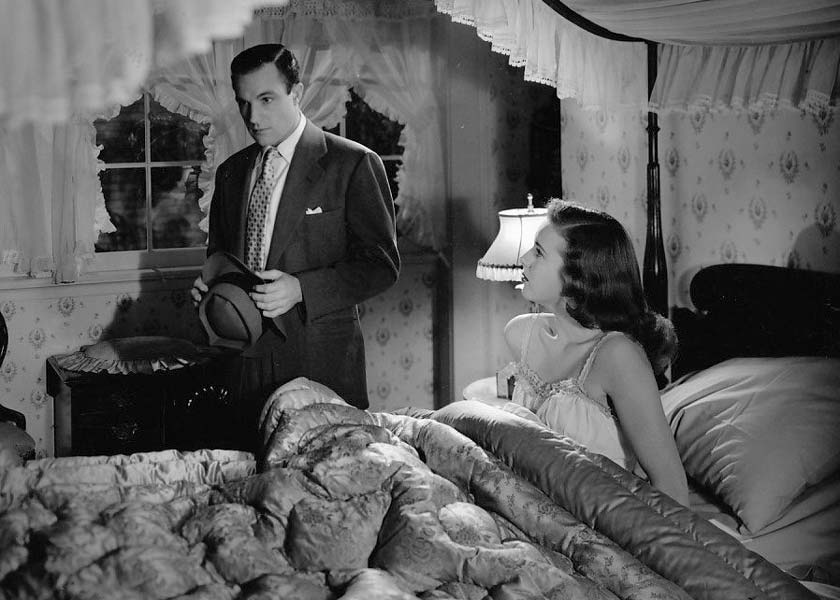Imagine the plot of Christmas Holiday, a film starring Deanna Durbin and Gene Kelly. Did you think of a jolly musical with yuletide trimmings? Well, scrap all of that. Directed by Robert Siodmak and inspired by W. Somerset Maugham’s novel of the same name, Christmas Holiday is a film noir as bleak as a barren moor.
Charles Mason (Dean Harens), a newly-commissioned lieutenant in the US Army, is overflowing with Christmas cheer, until a telegram arrives from his fiancée informing him that she’s just married someone else. Poor Charles doesn’t even merit a ‘Dear John’ letter—just a telegram. Christmas Eve finds him in a dive in New Orleans, where he’s thrust into the arms of Jackie (Deanna Durbin), a flinty hostess who, much to his surprise, insists on attending Midnight Mass with him. During the service, she sinks to the ground and weeps; Charles chivalrously steps in front of her, shielding her from view. Later, Jackie confesses her name is really Abigail and she’s married to Robert Manette (Gene Kelly), who murdered a bookmaker three years ago and was sentenced to life imprisonment. Charles is dumbfounded; Abigail’s manner is so matter-of-fact, she might as well be discussing the weather.
Her tangled history unravels in flashbacks. One night, Robert comes home late and before Abigail can confront him, impishly lists his excuses to her from A to E, disarming her with laughter. It’s a familiar pattern for them both. Except tonight, Robert is concealing a murder—Abigail’s voiceover juxtaposes the couple’s happiness with impending doom. Telltale signs begin to accumulate the next morning: a stain on a pair of Robert’s trousers that Mrs. Manette (Gale Sondergaard) is anxious to remove; Robert’s mother cryptically informing her son that there’s “nothing” in the morning paper; the discovery of a wad of cash Robert insists he won gambling. Abigail’s world is imploding around her and she is powerless to stop it.
The film’s opening titles proclaim it to be W. Somerset Maugham’s Christmas Holiday, which is true, in theory. In practice, Herman J. Mankiewicz’s script makes so many changes—Maugham’s story is about an Englishman meeting a Russian émigré masquerading as a princess in pre-war Paris—it’s virtually unrecognizable as an adaptation. Mankiewicz’s story stands well on its own, but there are surprising elisions, most notably the murder itself, which isn’t shown, and the true extent of Robert’s sociopathy.
Abigail’s devotion to Robert is also an enigma, at least at first. Halfway through the film, we finally see their first meeting. They sit side by side in the gallery at a concert hall, borne away by the sublime as the orchestra performs ‘Libestod’ from Wagner’s Tristan und Isolde. As foreshadowing goes, the music is almost hilariously apposite.(Siodmak filmed the scene at the Philharmonic Theatre in Los Angeles with live musicians and hundreds of extras.) The concert ends and as they shuffle out of their seats, Robert spontaneously confesses to Abigail, a complete stranger, that music is a transcendent experience for him. She is radiant with understanding.
Abigail loved Robert then; she loves him still. “They said it was shameful that I should love him. As if you could stop loving because it’s shameful to love,” she says in voiceover. In another film, her devotion might have been heroic—the love that redeemed Robert or kept him from harm. In Christmas Holiday, it’s a flagellant’s whip. The film was conceived as a vehicle for Deanna Durbin and she acquits herself well, particularly in the scenes which focus on Abigail’s self-imposed penance and the obsession underlying it.
But it’s Gene Kelly who shines. He shows us a man accustomed to getting by on boyish charm, putting on a performance to conceal the darkness which still seeps through in sudden explosions of anger and smiles that are just a little too bright. Kelly rarely had the chance to show his range as a dramatic actor; performances like this one show just how much of a missed opportunity that was.
Christmas Holiday is an anomaly: a grim noir with a perversely upbeat title and two stars cast against type to match. Its intensity sits oddly alongside its squeamishness about the brutality of its characters’ choices. But it’s effective nonetheless, especially when Kelly is onscreen. Just don’t watch it on Christmas morning.

Leave a Reply